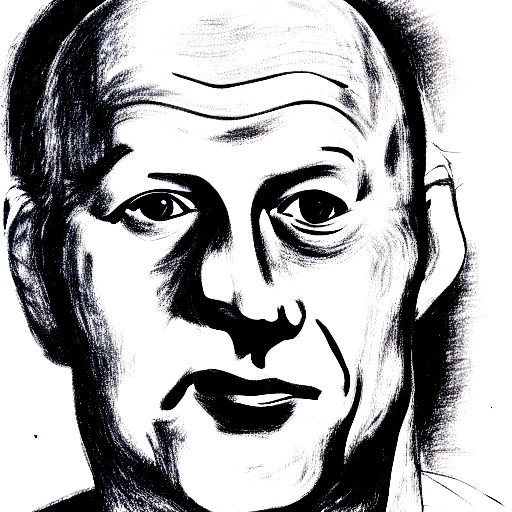Ken Elton Kesey (September 17, 1935 – November 10, 2001) was an American novelist, essayist and countercultural figure. He considered himself a link between the Beat Generation of the 1950s and the hippies of the 1960s.
Kesey was born in La Junta, Colorado and grew up in Springfield, Oregon, graduating from the University of Oregon in 1957. He began writing One Flew Over the Cuckoo's Nest in 1960 following the completion of a graduate fellowship in creative writing at Stanford University; the novel was an immediate commercial and critical success when published two years later. During this period, Kesey participated in government studies involving hallucinogenic drugs (including mescaline and LSD) to supplement his income.Following the publication of One Flew Over the Cuckoo's Nest, he moved to nearby La Honda, California and began hosting happenings with former colleagues from Stanford, miscellaneous bohemian and literary figures (most notably Neal Cassady) and other friends collectively known as the Merry Pranksters; these parties, known as Acid Tests, integrated the consumption of LSD with multimedia performances. He mentored the Grateful Dead (the de facto "house band" of the Acid Tests) throughout their incipience and continued to exert a profound influence upon the group throughout their long career.
His second novel, Sometimes a Great Notion—an epic account of the vicissitudes of an Oregon logging family that aspired to the modernist grandeur of William Faulkner's Yoknapatawpha saga—was a commercial success that polarized critics and readers upon its release in 1964, although Kesey regarded the novel as his magnum opus.In 1965, following an arrest for marijuana possession and subsequently faked suicide, Kesey was imprisoned for five months. Shortly thereafter, he returned home to the Willamette Valley and settled in Pleasant Hill, Oregon, where he maintained a secluded, family-oriented lifestyle for the rest of his life. In addition to teaching at the University of Oregon—an experience that culminated in Caverns (1989), a collaborative novel written by Kesey and his graduate workshop students under the pseudonym of "O.U. Levon"—he continued to regularly contribute fiction and reportage to such publications as Esquire, Rolling Stone, Oui, Running, and The Whole Earth Catalog; various iterations of these pieces were collected in Kesey's Garage Sale (1973) and Demon Box (1986).
Between 1974 and 1980, Kesey published six issues of Spit in the Ocean, a literary magazine that featured excerpts from an unfinished novel (Seven Prayers by Grandma Whittier, an account of Kesey's grandmother's struggle with Alzheimer's disease) and contributions from intellectuals including Margo St. James, Kate Millett, Stewart Brand, Saul-Paul Sirag, Jack Sarfatti, Paul Krassner and William S. Burroughs. After a third novel (Sailor Song) was released to lukewarm reviews in 1992, he reunited with the Merry Pranksters and began publishing works on the Internet until ill health (including a stroke) curtailed his activities.
Sol turns thousands of years of human wisdom from the world’s spiritual traditions into a totally unique personality profile. To get your own profile, check compatibility with friends and much more, download the Sol App today.
Some of their strengths
Ken Kesey has many admirable traits.
Based on spiritual traditions from around the world, they are someone who can be described as Confident, Sophisticated, Organized, Energetic, Intelligent, Optimistic, and Analytical.
Smart and Sophisticated
According to Mysticism’s Astrology tradition, Ken Kesey is someone who is a smart, sophisticated, and organized person who displays kindness and grace in every day interactions, and who also has a passionate soul. A person who really cares about helping others make the most of what they have.
Passionate and Intense
Based on Daoism’s Ba-Zi or ‘Chinese Zodiac’ tradition, people who know Ken Kesey well know them as someone who can be passionate, proud, and intense, like the sun or a blazing fire.
Organized and Achievement-oriented
According to Hinduism’s Jyotisha or ‘Vedic Astrology’ tradition, many would also describe Ken Kesey as someone who is organized, goal-oriented, practical, and persevering.
Who is hardworking, intellectual, and easygoing, who loves higher education and learning and sharing ideas with others, and who loves healthy competition.
Exacting and Achievement-oriented
Based on the Mayan Tzolk’in or ‘Mayan Astrology’ tradition, Ken Kesey is someone who has very high expectations for people, and who can be extremely focused on achieving goals and objectives.
They are also someone who is reflective, mysterious, and purposeful, who enjoys quiet and solo work, and who thrives in positions where there is no need to report to someone else.
Altruistic and Purposeful
According to Judaism’s Kabbalah tradition, Ken Kesey tends to be someone who has a desire to be of service to a higher calling and who is always trying to perfect things. Who can be practical and polished, reserved and methodical, and who tends to trust internal judgment before trusting anyone else at face value.
Some of Ken Kesey's challenges
While Ken Kesey has many strengths, nobody is perfect. They also have some challenging traits they need to manage.
For example, Ken Kesey can be Perfectionist, Self-centered, Selfish, Difficult, Hypocritical, Rebellious, and Emotionally Distant.
Difficult and Perfectionist
One of Ken Kesey's key challenges is that they are someone who can be difficult and too much of a perfectionist.
Callous and Selfish
Ken Kesey is someone who can be standoffish, pessimistic, and ruthless, who can have difficulty concentrating and be impatient, can have difficulty discovering the keys to personal contentment, and who can have a tendency to overwork and hoard wealth and possessions.
Critical and Bossy
Finally, Ken Kesey also can be too focused on the small details of life, try to control whatever is happening, and be finicky and demanding.

